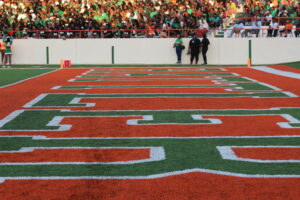
Photo Submitted by Thai Ali Floyd
Athletes are offered tutoring and physical therapy during their collegiate careers, but over the past few years they’ve also had to be treated for anxiety and depression.
According to a 2015 survey conducted by the NCAA, 30 percent of student-athletes reported they were overwhelmed. These statistics were an increase from the same survey that was conducted in 2010.
Athletes have tough schedules that include academics, their respective sports, and trying to maintain a social life. Their lives differ from those of regular students who don’t have the same obligations that they do.
Trying to maintain these different obligations can contribute to the factors that cause the decline in mental health such as lack of sleep, career-related issues, or personal health issues. Players have been very vocal about their struggles in hopes that they can destroy the stigmas that surround athletes and mental health.
“It’s as important as a sprained ankle, it’s something that needs to be discussed more. Athletes shouldn’t be looked down upon for having mental health issues,” said Khalid Kareem, a senior defensive lineman at Notre Dame University.
The culture of athletics and toughness has made it difficult for some athletes to speak about the issues that come with the expectation of their performance, the physicality of their sport, and more.
Calvin Ashley who is FAMU’s first five-star recruit, has been very transparent about his ongoing battle with anxiety and depression. He is focused on trying to be an advocate for mental health awareness in sports.
“Depression and anxiety itself is major, it’s killing people. I have a friend a few years ago he took his life, I played football with him. He was going through a lot,” said Ashley.
For Ashley, talking about his struggles is a form of therapy and he hopes that it will encourage more student-athletes to come forward. With honesty about their struggles eventually the stigmas surrounding mental health and athletics will disappear.
The NCAA is also trying to do its part to get student-athletes the help that they need. At the NCAA convention in Orlando, there was legislation passed to make mental health services and resources available for all student-athletes.
There is also a handbook on the NCAA website called “Mind, Body, Sport” which is the guide to student-athlete mental health. It includes perspectives from athletes, coaches, and even the NCAA’s chief medical officer, Dr. Brian Hanline.
With the constant conversation and advocates for mental health, hopefully student-athletes will get the help they need.